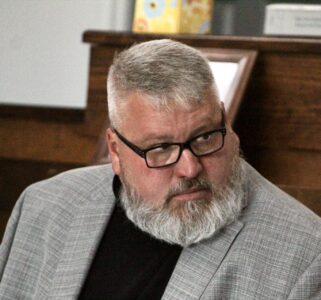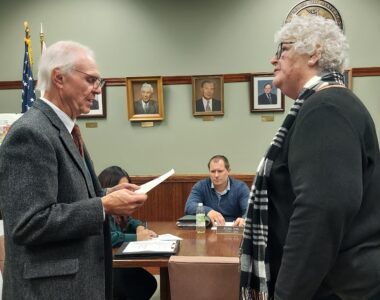Past, current county executives convene

Photo by Jimmy McCarthy Current County Executive Vince Horrigan, right, discussed what led him to run and the challenges of the position during a county executive gathering at the Robert H. Jackson Center on Tuesday.
Their runs for county executive came through various inspirations.
The issues they confronted didn’t have swift and easy solutions.
But the experience proved humbling and rewarding as five past county executives and current County Executive Vince Horrigan convened to tell their stories at the Robert H. Jackson Center on Tuesday. Greg Peterson, co-founder and board member, conducted the interview.
From the early 1800s up through 1975, a board of supervisors ran Chautauqua County. The board comprised of 37 members would appoint a chairman, or chief executive officer, for the county.
It wasn’t until the 1970s when the idea of a County Legislature gained momentum. One of those who led the way was the Hon. Joseph Gerace, who filed a lawsuit against the board of supervisors, the cities of Jamestown and Dunkirk, and state of New York claiming that the form of government was in violation of the constitution.
The case went to state Supreme Court where they mandated a plan for a 25-member, 12-district legislature effective Jan. 1, 1972.
Gerace said the lawsuit was the revolution that introduced him to become chairman of the legislature in 1972 followed by becoming the first county executive. A new charter took effect November 1973 with Gerace becoming the first county executive to be elected in 1974. Gerace began his term in 1975 and ended his tenure in May 1983.
See EXECUTIVES, Page A3
“My interest in politics came when I was about 12 years old and my father, who was an immigrant, was an avid follower of government and politics,” said Gerace, who also served as Busti town supervisor for a period of time. “I felt strong about politics.”
John A. Glenzer was the second county executive, serving from 1983-89. For those that ran and became county executive, Glenzer said it wasn’t their intention to better themselves. It was more to improve their community.
“I tried to treat people with respect,” he said. “One of the good things about being county executive is, with the help of the legislature, you get to impose your beliefs.”
Following Glenzer was Andy Goodell, who currently serves as state assemblyman. He said his work in the county law department and Glenzer’s interest in having him run factored into his decision. Goodell served from 1990-97.
“My first taste of being involved in politics was in (Glenzer’s) reelection campaign,” Goodell said. “After working with Glenzer, I found that I thoroughly enjoyed working with department heads in the county and working on the issues they were involved in.”
Having served from 1998 to 2005, Mark W. Thomas said his family sparked his desire to run. He said his parents were politically active with his dad serving on a committee in Rockford, Ill. and his mother engaged in the civil rights movement.
“It was always within the family,” he said.
Greg Edwards, who served from 2006-13, said his father was engaged in politics. Edwards went to college where he fared well in political science. His interest propelled when he became a mail boy for Stan Lundine in his bid for Congress.
“He was kind enough to give me the feeling of being involved in some significant thing,” he said. “More importantly, I saw what a statesman could do and ultimately present arguments and listen to the issues before them.”
Horrigan’s love for Chautauqua County and Bemus Point came from his summer days at Chautauqua Lake. Once his time with the Air Force was over, he knew he wanted to come back. After he spent time with the Red Cross, he went to Norm Herby and asked whether he thought he could be a legislator. After receiving encouraging words and becoming a legislator, another opportunity came.
“When Greg announced he wasn’t going to run for county executive, some people approached me and said you should for county executive,” he said. “I said ‘Why would I want to do that?”
The county executives went on to discuss some of the biggest challenges they faced. Dealing with a growing Medicaid share was one of Thomas’ biggest tasks while sewering the south end of Chautauqua Lake was Gerace’s biggest obstacle.
With Horrigan set to conclude his term at the end of the year, a seventh county executive will be elected in November. In attendance for the event were county executive hopefuls George Borrello, the Republican candidate, and Mike Ferguson, the Democratic candidate. Concluding the event, the county executives gave the candidates some advice. Glenzer said the candidates should be ready to work hard as it’s a large county while Thomas urged the candidates to reach out to the whole county. Goodell told the candidates to work with department heads to accomplish goals while Horrigan said to lead with energy and optimism.





